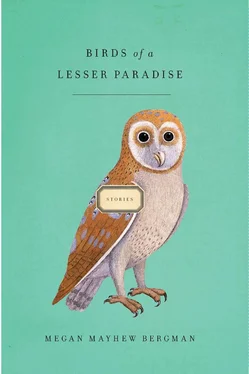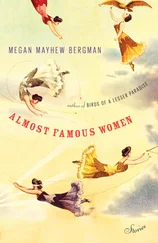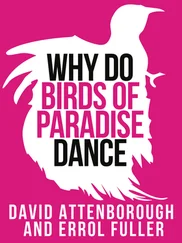He moved in close, as if he was going to kiss me. Perhaps he read the panic on my face, because he pulled away.
I went to school with the builder, he said, standing up. See you in the morning. Turn right two lights after the old post office and you’ll see signs. There’s only one inhabited house. You can’t miss it.
I drove into Smith’s abandoned neighborhood at nine. The sidewalks were overgrown and the swimming pool was green with algae and thick with debris. The clubhouse at the heart of the development was unfinished — the windowsills were unpainted; the screen door leaned against the stained stucco. Sewer pipes were stacked next to grass-choked For Sale signs on weedy empty lots. A sign advertising the development featured a toddler in sunglasses reclining on an inner tube, and a slogan: Home is HERE . It also said Satan Lives in red spray paint.
I couldn’t see Smith when I pulled up to his house, so I idled the car and dug out an old tube of lip gloss. The car door opened while I was homed in on my face in the rearview.
It’s not like the world can’t tell what’s hiding underneath, Smith said, sliding into the passenger seat. And besides — you have nothing to hide.
I didn’t see you coming, I said.
That, he said, pointing to the clubhouse as we drove out, is my command central. I put a minifridge and my radio in the office there. I don’t cook, though — the oven isn’t real. Just a plastic facade the builder put up when he ran out of money.
It’s quiet here, I said.
I have my cats, he said. I let them hunt the place.
You like it? I asked.
No real expenses, he said, shrugging his shoulders. I got a car out back — no plates, though. Drive at my own risk. Got an old cow skull glued to the front. He laughed.
Do you have waders? I asked. You’re gonna want something like that to keep the mud out of your pants in the swamp. And, you know, in case you surprise a snake. There are snakes.
We drove to the army/navy store. Dad has a tent you can borrow, I said, before going in.
Smith shopped quickly. He high-fived the seventy-year-old buzz-cut clerk and paid cash for a pair of cheap gaiters and insect repellent. We started the drive back to his house.
You know the elementary school? I said.
The empty one?
Dad owns it. Got it for a thousand bucks, I said. It’s beautiful inside. Wanna see it?
We parked in the untended lot, now raised and broken by tree roots. My heart raced as I unlocked the enormous double doors. Smith ran his fingers down the marble stone with the date the school was built: 1917.
The sun wasn’t on the building yet and the brick walls kept the place cool. Our voices bounced off of wooden floors the color of honey, floors scarred and gashed by hundreds of small shoes, sliding desks.
Smith grabbed my wrist and pulled me into a dark classroom where the ceiling tiles heaved with moisture and outdated maps curled against a chalkboard.
After years alone and long stretches of celibacy, I’d forgotten how it felt to be flipped on like a light, to try to concentrate when your blood and heart were screaming inside you.
I leaned against the cinder-block wall. Smith put one hand above my head and closed in on my face. I hadn’t been touched this way in years.
I gave him my mouth and tilted my head back to keep the hot tears in my eyes from spilling down my face. I wanted to keep them to myself. I worried they came from something awful, like gratitude.
The next morning, Smith met us at dawn. He was all arms and legs and his pack rattled when he walked — too many useless carabiners dangling from straps and zippers. I found my skepticism of Smith renewed, despite our strong attraction. What did he want from me? I thought. From us?
Let’s bring that old dog of yours, he said to Dad. I’ll hold her leash if you need to approach any birds.
She does like adventure, Dad said. And it’s not too hot. I’ve got a packable water bowl.
Dad was always looking for an excuse to have Betsy along. She rode in the back of the pickup, which we left at the head of an old logging road a mile into the swamp.
The spring sun was already warm as we threw on our packs, which were stuffed with sleeping bags, tents, food, and a few changes of clothes.
Dad, I said. Can I dab sunscreen on your nose?
He closed his eyes like a relenting child and kept talking while I smeared lotion across his face. His skin was porous and age spots were beginning to form on his forehead.
I can’t help but be excited, he said.
The trail was sandy and flat and the tree cover was thick; the thin trunks of young pines and oaks arced over our heads. The farther we went in, the more my ears grew attuned to birdsong. Dad kept a water bottle in one hand and led the procession with a fast pace, which made him wheeze. His excitement and hope began to nag at me. I didn’t want to see him let down.
Smith handed me a bag of homemade trail mix.
The good kind, he said. Minimarshmallows, chocolate, peanuts, and dried cherries. Every few steps he tossed a peanut to Betsy, who had left my father’s side and now followed Smith with food-driven devotion.
Who is this man? I wondered. Where had he come from?
Where’d you go to school? I asked.
Middlebury, he said. For two years. Took some biology.
We kept walking. I could smell my hot skin. My pack was too heavy, but I wasn’t going to admit to such a novice mistake.
The male ivory-billed, Dad said, has a black chin and a red crest. Juveniles and females have a black crest, but the bill is chalk white. The call sounds like a horn.
Smith turned to smile at me over his pack. A navy bandana covered his wild hair. I felt guilty sharing a secret with him, that my father was unaware of what had taken place between us.
Smith stopped, midtrail, and put his hand on my father’s shoulder. He placed his finger to his lips and cupped his ear.
Listen, he said. From over there.
Dad paused.
It must be a double drum, Dad said, shaking his head. That’s a single. Not the one.
I glared at Smith.
Look, Dad said. It’s probably not going to happen, and if it does happen, it won’t happen this soon.
He trudged on, a little heavier, a little more tired. After a few hours Dad’s neck was drenched in sweat and he wiped his forehead often.
Can I carry your camera for you? I asked Dad.
Did you bring the woodpecker call? he asked.
I nodded. We walked on, hot and hungry. I was ready for a break, but I’d go as long and as far as Dad wanted.
Don’t get his hopes up, I whispered to Smith. This might be fun for you, but it means something to him.
Smith looked like I’d sucker-punched him.
Sorry, he said.
It was just after six when we settled in to camp. We found a small clearing, the site of an old logging camp. Its remains, mostly rusted tin roofs, lay in overgrown heaps in the woods beyond the tree line. The maple and swamp gum around us were choked with smilax. The cicadas were humming and the evening sky was still blue as we threw up three tents. I could hear the frogs tuning up; we were just north of Lake Drummond, near the old lumber canal. Dad opened his tent for Betsy, but she remained with Smith, who tossed sticks into the woods for her to chase.
I was tired and a blister was forming on the back of my right heel. While Dad started a fire to keep bugs away, I set up the camp stove and heated water for tea. I unwrapped the sweet potatoes I’d baked earlier and mixed them with roasted garlic and black beans and heated them in a skillet over the stove.
After eating, Dad thumped his chest and squirmed.
Feel okay? I asked.
Heartburn, he said. Just need some water.
Читать дальше












